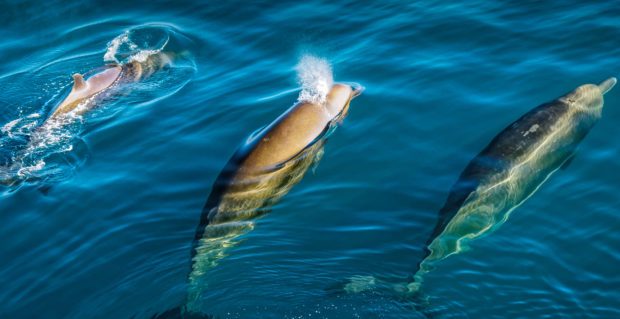Naval sonar can severely disrupt the behaviour of northern bottlenose whales over distances never previously tested, according to new research.
An international team led by St Andrews and Iceland universities used sensors attached to the whales and deep-ocean acoustic listening devices.
They found military sonar sounds caused the animals to stop feeding, swim away from the source of the noise and go into a deep dive.
The new study, published on Wednesday in Proceedings of the Royal Society B, was led by St Andrews Professor Patrick Miller and Dr Paul Wensveen of the University of Iceland and involved a large team of scientists and engineers as part of the 3S (Sea Mammals, Sonar, Safety) international research project.
Prof Miller said: “All tagged whales stopped feeding, and individuals started swimming away from the exposure site for several hours when a certain sound level was reached, regardless of their proximity to the source – up to 28km away.
“One of the whales immediately responded by diving to a depth of 1.6km that lasted 130 minutes, which, to the best of our knowledge, is the longest dive recorded for this species of whale.
“We used a sound source that is smaller than a typical operational naval sonar, so the concern is that the distances at which animals respond in the wild to real navy sonars may be significantly greater.”
Research on elusive beaked whales, which include the northern bottlenose whale, has intensified following a number of unusual mass strandings in Iceland, Scotland, Ireland and Norway.
However, their behaviour and location means that they remain poorly understood.
The animals inhabit areas that are frequently used by navies for sonar training and testing.
Tests were conducted near Jan Mayen, an island north of Iceland, in an area which still has relatively little noise pollution.
A dozen northern bottlenose whales were tagged then exposed to sonar sounds in three experiments.
Responses of other bottlenose whale groups in the area were also monitored using listening devices.
Dr Paul Wensveen from the University of Iceland said: “Within the context of what is known about beaked whales, our results suggest that the relative pristineness of the environment might be an important factor in how these sensitive animals respond to sonar sounds.
“A lack of frequent or predictable exposures might mean fewer opportunities for the animals to learn that sonar signals pose lower risk when they come from far away.”










